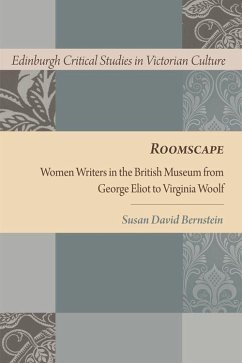Arguing not only that the British Museum Reading Room facilitated various practices of women's literary traditions, the author also questions the overdetermined value of privacy and autonomy in constructions of female authorship, a principle generated from Woolf's feminist manifesto.
Examines the Reading Room of the British Museum using documentary, theoretical, historical, and literary sources This study explores a specific site - the Reading Room - as a space of imaginative potential in relation to the emergence of modern women writers in Victorian and early twentieth-century London. Drawing on archival materials, the book looks at the significance of this space and its resources for women who wrote translations, poetry, and fiction. It challenges an assessment of the British Museum's Reading Room as a bastion of class and gender privilege, an image established by Virginia Woolf's A Room of One's Own. And it questions the value of privacy and autonomy in constructions of female authorship. Rather than viewing reading and writing as solitary, individual events, Roomscape introduces the concept of 'exteriority' to investigate the public, social, and spatial dimensions of literary production. Along with an appendix of notable readers at the British Museum from the last two centuries, the book contributes to scholarship on George Eliot, Amy Levy, Eleanor Marx, Christina Rossetti, Mathilde Blind, and Virginia Woolf. Susan David Bernstein, Professor of English at the University of Wisconsin-Madison, is the author of Confessional Subjects: Revelations of Gender and Power in Victorian Literature and Culture (1997) as well as the co-editor with Elsie B. Michie of Victorian Vulgarity: Taste in Verbal and Visual Culture (2009).
Hinweis: Dieser Artikel kann nur an eine deutsche Lieferadresse ausgeliefert werden.
Examines the Reading Room of the British Museum using documentary, theoretical, historical, and literary sources This study explores a specific site - the Reading Room - as a space of imaginative potential in relation to the emergence of modern women writers in Victorian and early twentieth-century London. Drawing on archival materials, the book looks at the significance of this space and its resources for women who wrote translations, poetry, and fiction. It challenges an assessment of the British Museum's Reading Room as a bastion of class and gender privilege, an image established by Virginia Woolf's A Room of One's Own. And it questions the value of privacy and autonomy in constructions of female authorship. Rather than viewing reading and writing as solitary, individual events, Roomscape introduces the concept of 'exteriority' to investigate the public, social, and spatial dimensions of literary production. Along with an appendix of notable readers at the British Museum from the last two centuries, the book contributes to scholarship on George Eliot, Amy Levy, Eleanor Marx, Christina Rossetti, Mathilde Blind, and Virginia Woolf. Susan David Bernstein, Professor of English at the University of Wisconsin-Madison, is the author of Confessional Subjects: Revelations of Gender and Power in Victorian Literature and Culture (1997) as well as the co-editor with Elsie B. Michie of Victorian Vulgarity: Taste in Verbal and Visual Culture (2009).
Hinweis: Dieser Artikel kann nur an eine deutsche Lieferadresse ausgeliefert werden.

